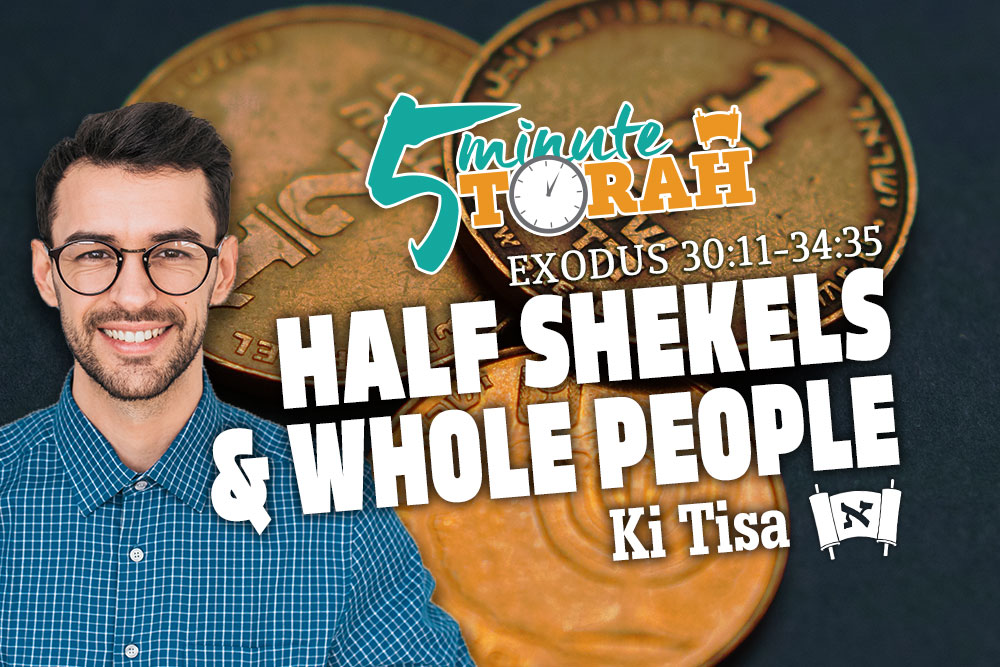Half Shekels and Whole People
Series:

Parashat Ki Tisa (Exodus 30:11-34:35)
Although Parashat Ki Tisa covers a wide range of topics and events, the opening paragraph of this portion is our focus for this week’s insight. It is the LORD’s command for each of the Israelites who are at least twenty years old to bring a half-shekel offering to the LORD:
Each one who is numbered in the census shall give this: half a shekel according to the shekel of the sanctuary (the shekel is twenty gerahs), half a shekel as an offering to the LORD. Everyone who is numbered in the census, from twenty years old and upward, shall give the LORD's offering. The rich shall not give more, and the poor shall not give less, than the half shekel, when you give the LORD's offering to make atonement for your lives. (Exodus 30:13–15)
The most common question asked about this passage is, “Why only a half shekel?” The most common answer is that it’s only when we work together that we are able to create the whole. But I would like to add a slight nuance into this understanding.
First, although the Torah tells us that this half shekel was given by the Children of Israel in order “to make atonement for your lives” (Exodus 30:15). The LORD continues by telling Moses, “You shall take the atonement money from the people of Israel and shall give it for the service of the tent of meeting, that it may bring the people of Israel to remembrance before the LORD, so as to make atonement for your lives” (vs. 16). We know from this that the money was somehow used “for the service of the tent of meeting.” But how was this money actually utilized?
Jewish sources tell us that the funds collected through this means were used to purchase livestock for communal offerings. How does this fulfill the reason outlined above and “bring the people of Israel to remembrance before the LORD, so as to make atonement?” When we help others to fulfill a mitzvah (a commandment) we are also helping them to be visible in the eyes of their Heavenly Father. It happens when we work together.
In Ki Tisa we learn that Hashem designates Bezalel and Ohaliab as the primary artisans who would be in charge of making everything that was needed for the Tabernacle from start to finish. He also appointed other craftsmen to assist them because Bezalel and Ohaliab were not supposed to do everything themselves. They were supposed to be the lead craftsmen. But what about the common Israelites that were not craftsmen? Did they play a part in the work also?
Back in Parashat Terumah we learned that every Israelite would have an opportunity to contribute to the creation of the Tabernacle and its furnishing by donating items that would be used for its construction. The Tabernacle wasn’t disconnected from the common Israelite. Every individual was personally invested in its successful completion, and ultimately in its purpose.
How does this relate to us today? The author of Hebrews reminds us that we continue to share a role together with our brothers and sisters in Messiah, saying, “Do not neglect to do good and to share what you have, for such sacrifices are pleasing to God” (Hebrews 13:16). Yeshua said, “So whatever you wish that others would do to you, do also to them, for this is the Law and the Prophets” (Matthew 7:12). Even though we should all have a personal faith experience and a personal connection to our Creator, our faith finds its strength in community. Despite the sentiments of Cain, we are our brother’s keeper. What we do with others and for others will determine both of our destinies.
The half shekel was an amount that everyone was able to contribute. We are told that it was a fixed amount that each person was required to give. The rich could not give more and the poor could not give less (Exodus 30:15). This reminds us that we don’t have to do something elaborate to make a difference. Each time we invest into the lives of another—no matter how seemingly small and insignificant it may be—it is as if we are adding our half-shekel to theirs in order to make a whole… a whole person, not just a whole shekel. Sometimes half shekels can end up making whole people.








